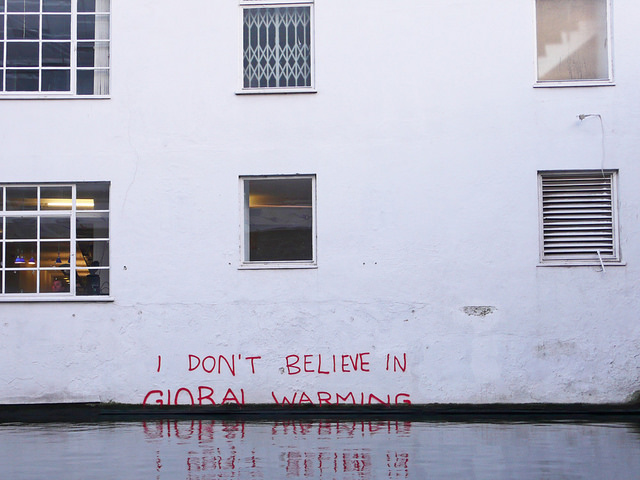Does New York Magazine's Doomsday Climate Article Go Too Far?
By:
A new article in New York Magazine—one detailing the worst-case scenario for global warming—has people freaking out over the potential havoc climate change could wreak on humanity. The article, written by David Wallace-Wells, is blunt: climate change isn't just a problem for the Middle East or Miami, it has the potential to bring the end of human life on planet Earth. As Wells puts it, "no matter how well-informed you are, you are surely not alarmed enough."
 Duncan Hull - flickr.com
Duncan Hull - flickr.com
Mass extinction?
According to the article, the Earth has experienced five mass extinctions—situations in which most of the life of the planet died. All of them except for one—the one that killed the dinosaurs—"were caused by climate change produced by greenhouse gas." According to Wells, "The most notorious was 252 million years ago; it began when carbon warmed the planet by five degrees, accelerated when that warming triggered the release of methane in the Arctic, and ended with 97 percent of all life on Earth dead. We are currently adding carbon to the atmosphere at a considerably faster rate; by most estimates, at least ten times faster."
Okay, I'm listening. How bad is it?
Wells details the horrors that await humanity in a warmer future. First, there's the possibility that heat will simply kill us. That process has already started "with roughly 30 percent of the human population exposed to deadly conditions each year," according to the Huffington Post. If global temperatures rise just six degrees, "everybody in the country east of the Rockies would be under more heat stress than anyone, anywhere, in the world today." He notes that the Hajj—the annual muslim pilgrimage to Mecca—will be impossible in a couple decades.
Then there's food. Wrote Wells, "the basic rule for staple cereal crops grown at optimal temperature is that for every degree of warming, yields decline by 10 percent." Yikes. He notes that if temperatures rise by five degrees by the end of the century, we'll have 50 percent more people, and 50 percent less food. Water is even more dire: "By 2080, without dramatic reductions in emissions, southern Europe will be in permanent extreme drought, much worse than the American dust bowl ever was." And that's just Europe. Breadbaskets across the world would also undergo drought.
The article goes on to outline how unmitigated climate change could create deadly smog, the thawing of ancient plagues (to which we have no resistance) currently frozen in permafrost, never-ending war, economic collapse, and poisonous oceans.
Needless to say, people were freaked out.
But some folks are pushing back on the claims in the article.
These aren't climate-change deniers, or Exxon executives, but scientists who think the article simply goes too far. As Michael Mann, a climate scientist at Penn State, wrote for CommonDreams.org, "The evidence that climate change is a serious problem that we must contend with now is overwhelming on its own. There is no need to overstate the evidence, particularly when it feeds a paralyzing narrative of doom and hopelessness."
Mann notes a few problems with the article. He wrote, "The article paints an overly bleak picture by overstating some of the science. It exaggerates for example, the near-term threat of climate "feedbacks" involving the release of frozen methane (the science on this is much more nuanced and doesn't support the notion of a game-changing, planet-melting methane bomb."
Another article by Daniel Aldana Cohen, in Jacobin, claims that the real danger facing humanity isn't the effects of unmitigated climate change, but the wars and violence that will be unleashed on the world even if we manage to slow climate change. "Yes, obviously, absent any real action to reduce emissions we’re fucked. BUT: That is not going to happen. The actually realistic danger zone is a combination of too little decarbonization, too late, in the context of hardening inequalities of class, race, and gender —in short, eco-apartheid. Those brutal inequalities, and the bullets that maintain them—not molecules of methane —are what will kill people."
Is scaring people necessary to encourage action on climate change?
Obivously, there are still those in our government who would rather ignore the problem for short-term gain, rather than confront the reality of climate change. So maybe fear about the worst-case scenario is exactly what we need.
But as Mann notes, "there is also a danger in overstating the science in a way that presents the problem as unsolvable, and feeds a sense of doom, inevitability and hopelessness."
